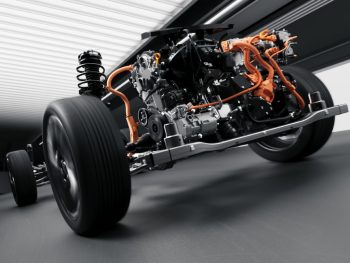Hyundai Motor Group debuts significantly enhanced hybrid tech
Hyundai Motor Group has unveiled its next-generation hybrid powertrain system, claimed to deliver a new standard for power and efficiency, and ready for rollout across Hyundai, Kia and Genesis models.

The new hybrid system offers 45% better fuel efficiency and 19% more power compared with ICE powertrains of the same class
Unveiled at the group’s ‘Next-Gen Hybrid System Tech Day’, the new system is said to have been significantly enhanced with innovative electrification technologies to improve performance and fuel efficiency. It’s claimed to offer 45% better fuel efficiency and 19% more power compared with ICE powertrains of the same class.
The next-generation hybrid system features a new transmission with two integrated motors. The P1 motor handles starting, battery energy generation and energy deployment to assist propulsion. The P2 driving motor is responsible for propulsion and regenerative braking. Hyundai said the integrated dual-motor setup “improves power, performance and fuel efficiency while achieving smooth shifting and reduced noise and vibrations for a more refined driving experience”.
The transmission can be paired flexibly with a range of internal combustion engines, enabling its use across a range of vehicle classes. It’s able to be married up with internal combustion engines across the group’s lineup, delivering a system output from 100hp to around 300hp, allowing for broad application from sub-compact to large vehicles.
The new, next-generation hybrid system also integrates features commonly found in the group’s EVs, such as Stay Mode, vehicle-to-load (V2L) functionality with up to 3.6kW, and smart regenerative braking.
The first powertrain to use the next-generation hybrid system features a new turbocharged 2.5-litre petrol engine that will debut first in the all-new Hyundai Palisade SUV for the US and other markets.
A new, next-generation gasoline 1.6-litre turbo hybrid powertrain will also be available.
Hyundai Motor Group also showcased other new electrification-focused technologies, including electric all-wheel drive (e-AWD). This system adds a P4 driving motor to the rear axle on vehicles equipped with this technology, enhancing driving performance and acceleration response.
The group plans to offer both e-AWD and conventional mechanical AWD, offering the “optimal all-wheel-drive configuration according to vehicle class and regional market requirements”.
Other new debuts include electrification-vehicle motion control (e-VMC 2.0), e-Handling 2.0, electrification-evasive handling assist (e-EHA 2.0), e-Ride 2.0, Stay Mode, V2L and Smart Regenerative Braking.
The group also plans to introduce a rear-wheel-drive 2.5-litre turbo hybrid system in 2026 and aims to gradually expand its hybrid technology to the Genesis luxury brand by applying this powertrain to key models over time.
For all future hybrid models, the group plans to apply the newly unveiled hybrid system and further electrification-focused technologies, “tailoring these to the characteristics of individual vehicles and classes, as well as regional market requirements”.














Leave a comment